
Jefferson Starship is an American rock band from San Francisco, California, formed in 1974 by a group of musicians including former members of Jefferson Airplane. Between 1974 and 1984, they released eight gold or platinum-selling studio albums, and one gold-selling compilation. The album Red Octopus went double-platinum, reaching No. 1 on the Billboard 200 chart in 1975. The band went through several major changes in personnel and genres through the years while retaining the Jefferson Starship name. The band name was retired in 1984, but it was picked up again in 1992 by a revival of the group led by Paul Kantner, which has continued since his death in 2016.
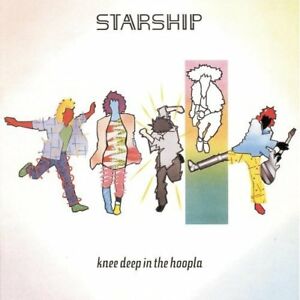
Knee Deep in the Hoopla is the debut studio album by American AOR band Starship, the succeeding musical project to Jefferson Starship. It was released on September 12, 1985, through record label Grunt. Four singles were released from the album: the No. 1 hits "We Built This City" and "Sara", "Tomorrow Doesn't Matter Tonight" and "Before I Go".

Martyn Jerel Buchwald, known as Marty Balin, was an American singer, songwriter, and musician best known as a member of Jefferson Airplane and Jefferson Starship.
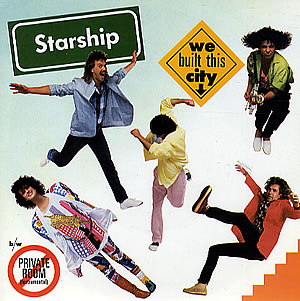
"We Built This City" is the debut single by American rock band Starship, from their 1985 debut album Knee Deep in the Hoopla. It was written by English musicians Martin Page and Bernie Taupin, who were both living in Los Angeles at the time, and was originally intended as a lament against the closure of many of that city's live music clubs.

Red Octopus is the second album by American rock band Jefferson Starship, released on Grunt Records in 1975. Certified double platinum by RIAA in 1995, it is the best-selling album by any incarnation of Jefferson Airplane and its spin-off groups. The single "Miracles" was the highest-charting single any permutation of the band had until Starship's "We Built This City" a decade later, ultimately peaking at No. 3 on the Billboard singles chart; the album itself reached No. 1 for four non-consecutive weeks on the Billboard 200. As was common in the era, stereo and quadraphonic mixes of the album were released concurrently.
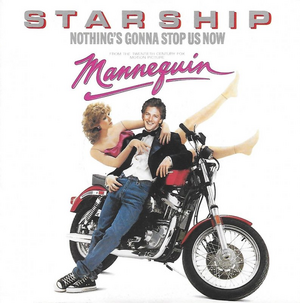
"Nothing's Gonna Stop Us Now" is a song co-written by Diane Warren and Albert Hammond and recorded by American rock band Starship for their second studio album, No Protection (1987). It is a power ballad duet featuring vocalists Grace Slick and Mickey Thomas and is the theme to the romantic-comedy film Mannequin.
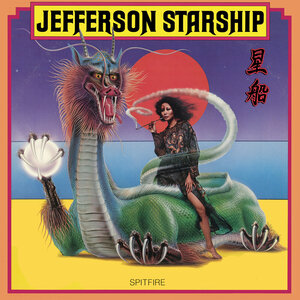
Spitfire is the third album by American rock band Jefferson Starship. Released in 1976, a year after the chart-topping Red Octopus, it quickly scaled the charts, peaking for six consecutive weeks at No. 3 in Billboard and attaining a RIAA platinum certification. The album features writing contributions from members of singer Marty Balin's former band Bodacious DF, as well as Jesse Barish, who became one of Balin's frequent collaborators. Stereo and quadraphonic mixes of the album were released. "Song to the Sun" was included in the 1977 Laserock program.
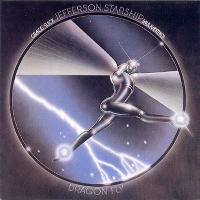
Dragon Fly is the debut album by Jefferson Starship, released on Grunt Records in 1974. It peaked at No. 11 on the Billboard 200, and has been certified a gold album. Credited to Grace Slick, Paul Kantner, and Jefferson Starship, the band itself was a turning point after a series of four albums centering on the partnership of Kantner and Slick during the disintegration of Jefferson Airplane through the early 1970s.
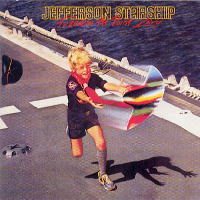
Freedom at Point Zero is the fifth album by American rock band Jefferson Starship, released in 1979. It was the first album for new lead singer Mickey Thomas, and the first after both Grace Slick and Marty Balin left the previous year. Aynsley Dunbar plays drums on this album; he had left Journey the previous year. The album cover was shot on location in the San Francisco Bay on board the USCGC Midgett.
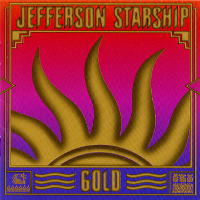
Gold is a compilation album by American rock band Jefferson Starship, released on Grunt Records in 1979. It collects the band's four Top 40 hit singles from the 1970s, as well as three additional singles that charted on the Billboard Hot 100, a single that missed the chart, one b-side, and one album track. All tracks were also featured on their four studio albums to date: Dragon Fly from 1974; Red Octopus from 1975; Spitfire from 1976; and Earth from 1978. It peaked at No. 20 on the Billboard 200, and has been certified a gold record by the RIAA.

Earth is the fourth album by American rock band Jefferson Starship. The album was recorded in 1977, with the same band lineup as the previous album, Spitfire and released in 1978.

"This One's for You" is the title track from the 1976 album by Barry Manilow with words and music by Manilow and Marty Panzer. The song peaked at number 29 on the Billboard Hot 100, and at number one on the Easy Listening chart, reaching the top position for one week in November 1976, Manilow's fifth number one overall on that chart.

"Miracles" is a song written by Marty Balin and originally recorded by Jefferson Starship, appearing on its 1975 album Red Octopus.
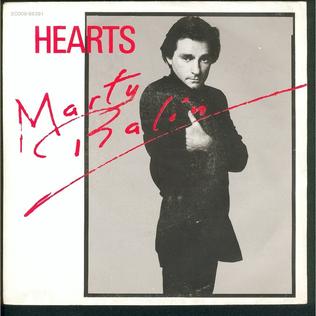
"Hearts" is a song written by Jesse Barish and performed by Marty Balin in 1981, included on his debut solo album Balin. It was Balin's third single in nineteen years and the biggest hit of his solo career.

"Count on Me" is a 1978 song and single by Jefferson Starship written by Jesse Barish for the album Earth. The single, in lighter rock mode, gave Starship another US Top 10 hit after "Miracles". It was featured in the end credits to the movies Grown Ups and The Family Stone.

"Jane" is a song by American rock band Jefferson Starship, released on their 1979 album Freedom at Point Zero. The song peaked on the US Billboard Hot 100 at No. 14 and spent three weeks at No. 6 on the Cash Box Top 100. In Canada, the song peaked at No. 13. Billboard Magazine described "Jane" as "a fiery track paced by stinging guitars and some burning rhythm work." Cash Box described it as "an explosive rocker, with slashing guitars." Record World called it a "driving rocker" and praised Mickey Thomas' vocals. GQ in 2015 said it was a "perfect, complex, trash-gem work of art."

"Runaway" is a 1978 song and single by Jefferson Starship, written by Nicholas Q. Dewey for the album Earth. It was the second U.S. Top 40 hit from that album, and was the follow-up to the Top 10 hit "Count On Me". The song peaked at #12 on the U.S. Billboard Hot 100 and number 13 on the Cash Box Top 100.
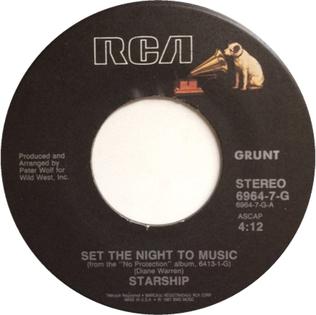
"Set the Night to Music" is a song written by Diane Warren and recorded by Starship for their LP, No Protection (1987). It became a major hit for Roberta Flack in 1991. Starship's original version became a Top 10 hit on the U.S. Billboard Adult Contemporary chart, reaching number nine in the spring of 1988, and also charted minorly in Canada. The song appeared at the end credits of the 1988 fantasy-comedy film Vice Versa starring Judge Reinhold and Fred Savage.
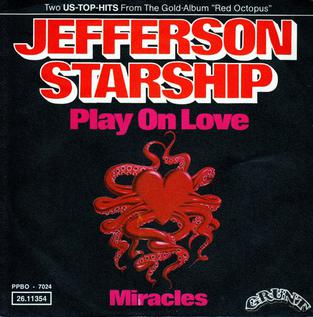
"Play on Love" is a 1975 song by Jefferson Starship. It was the second of two singles issued from their Red Octopus LP.



















